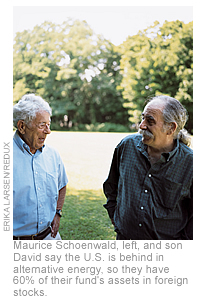Green Pioneers
The managers of the first alternative-energy fund offer their take on this red-hot sector.

Profit and prosper with the best of Kiplinger's advice on investing, taxes, retirement, personal finance and much more. Delivered daily. Enter your email in the box and click Sign Me Up.
You are now subscribed
Your newsletter sign-up was successful
Want to add more newsletters?

Delivered daily
Kiplinger Today
Profit and prosper with the best of Kiplinger's advice on investing, taxes, retirement, personal finance and much more delivered daily. Smart money moves start here.

Sent five days a week
Kiplinger A Step Ahead
Get practical help to make better financial decisions in your everyday life, from spending to savings on top deals.

Delivered daily
Kiplinger Closing Bell
Get today's biggest financial and investing headlines delivered to your inbox every day the U.S. stock market is open.

Sent twice a week
Kiplinger Adviser Intel
Financial pros across the country share best practices and fresh tactics to preserve and grow your wealth.

Delivered weekly
Kiplinger Tax Tips
Trim your federal and state tax bills with practical tax-planning and tax-cutting strategies.

Sent twice a week
Kiplinger Retirement Tips
Your twice-a-week guide to planning and enjoying a financially secure and richly rewarding retirement

Sent bimonthly.
Kiplinger Adviser Angle
Insights for advisers, wealth managers and other financial professionals.

Sent twice a week
Kiplinger Investing Weekly
Your twice-a-week roundup of promising stocks, funds, companies and industries you should consider, ones you should avoid, and why.

Sent weekly for six weeks
Kiplinger Invest for Retirement
Your step-by-step six-part series on how to invest for retirement, from devising a successful strategy to exactly which investments to choose.

Ethanol, biofuels, and solar, wind and ocean power. With oil prices in the stratosphere, everyone, it seems, is suddenly interested in alternative energy. But Maurice Schoenwald and his son, David, have been exploring the best investment opportunities in this rapidly growing industry for more than a quarter-century.

They launched New Alternatives, the first fund to focus on alternative-energy stocks, in 1982. The Schoenwalds, lawyers by training, haven't done badly for their clients. Over the past ten years to August 1, New Alternatives (symbol NALFX; 800-441-6580; 4.75% sales charge) gained 9% annualized. That topped Standard & Poor's 500-stock index by an average of nearly four percentage points per year.
The Schoenwalds are passionate liberals who employ social screens to pick stocks. Several years ago, they sold their position in Chesapeake Energy after learning that its chief executive was involved in Swift Boat Veterans for Truth, a group that opposed Democratic presidential candidate John Kerry in 2004. Chesapeake's stock subsequently turned out to be a big winner. To learn about the Schoenwalds' approach to picking stocks in this fast-growing industry, we visited them at their office in Melville, N.Y., on Long Island.
From just $107.88 $24.99 for Kiplinger Personal Finance
Become a smarter, better informed investor. Subscribe from just $107.88 $24.99, plus get up to 4 Special Issues

Sign up for Kiplinger’s Free Newsletters
Profit and prosper with the best of expert advice on investing, taxes, retirement, personal finance and more - straight to your e-mail.
Profit and prosper with the best of expert advice - straight to your e-mail.
KIPLINGER'S: Should investors be betting heavily on alternative-energy stocks?
MAURICE SCHOENWALD: Our fund was up 34% in 2006, 12% in the first quarter of 2007 and another 12% in the second quarter. Every quarter I write to our shareholders: "Look, this is very nice, but we can't keep on going at this rate."
Is this an Internet-like bubble in the making?
MAURICE: I don't think so. A lot of the movement in the stocks is due to rising oil prices. The price of oil is not going to collapse. Look at what's happening in solar energy. Makers of solar cells can't make enough of them because they can't get enough silicon. Eventually they will, and the price of these devices will go down. But the market for solar is going to get very big.
What kind of alternative energy do you think holds the most promise?
MAURICE: Ocean energy.
How does it work?
MAURICE: There are different systems. You can put a turbine underneath the water and let the current make the turbine turn. Because water is much stronger than air, the turbine creates much more electricity than wind-driven machines do. You connect a wire to the shore to transport the electricity. In another system, the waves are used to generate electricity. They put a buoy-type thing in the water, and the buoy goes dup-dedup-dedup and that cranks up the turbine. The problem is that the government says you have to have a license to put these devices in the water, and, so far, the licenses have gone to universities and to private entities. So it's difficult to find companies in this area to invest in.
What ocean-energy companies do you own?
DAVID SCHOENWALD: We own small amounts of two of them, Ocean Power Technologies and Renewable Energy Holdings. The latter is a British company. Neither is profitable.
What part of alternative energy excites you?
DAVID: I like wind, even though the wind doesn't always blow at the right speed at the right location all the time. I like ethanol produced from sugar cane, which I feel is a better feedstock than corn. I also think well of combined heat and power, which is a means to make better use of whatever fuel is used in a commercial or industrial setting. We own shares of South Jersey Industries, a natural-gas utility that has a division that develops combined heat and power facilities. The utility also has joint ventures involving the use of landfill methane gas as a fuel.
What's your biggest ethanol-related holding?
DAVID: It would be Abengoa, a Spanish company. It got into the U.S. ethanol business by buying a company called High Plains. Abengoa also has facilities in Europe.
Nuclear power is a clean source of energy. Why don't you own any nuclear-related stocks?
DAVID: We are concerned about the potential of Three Mile Island-type disasters and the lack of storage sites for the waste.
Where do you get your ideas?
MAURICE: From the very beginning of the fund, we regularly asked our shareholders, in our quarterly reports, to tell us what they would like us to invest in and what they would like us not to invest in.
What's an example of an idea that came from a shareholder?
DAVID: The most recent one is a division of EDF, a French utility. It's called EDF Energies Nouvelles, which does wind energy. I got an e-mail from a shareholder who said she was in Australia and heard that EDF was going to spin out part of its renewable-energy division.
TOP TEN: NEW ALTERNATIVES
Below are the ten biggest holdings of New Alternatives fund, as of June 30, and the percent of assets each holding comprises.
- Renewable Energy, 4.6%
- Acciona Group, 4.2%
- Abengoa, 4.2%
- Vestas Wind Systems, 3.9%
- Gamesa, 3.8%
- Schneider Electric, 3.6%
- Orkia, 3.6%
- Conergy AG, 3.5%
- Q-Cells, 3.5%
- Ormat Technologies Inc., 3.4%
What are some other sources?
DAVID: There are some good publications in these areas. There's a German magazine called Photon International. It has an English version. On alternative energy in general, there's a new entity, called New Energy Finance, that has hired 64 people to do research pieces.
Do you care about price when you choose a stock?
DAVID: We don't have any specific price-earnings-ratio or price-to-sales-ratio cutoffs. We favor stocks with reasonable P/Es and reasonable price-to-sales ratios, as well as reasonable debt levels. I also pay attention to insider sales and to who else owns the stock.
Which stock in your portfolio offers the most potential reward?
DAVID: I don't have a favorite. I like Abengoa and Acciona, both in Spain. Gamesa is a wind company in Spain. Vestas is a wind company in Denmark. We've done very well with a company in Norway called Renewable Energy, which makes silicon that's sold to people who make solar cells. It also makes solar cells. Speaking of solar, a lot of Chinese solar companies have gone public in the U.S. and have done very well. As a socially responsible fund, we are concerned that one reason the companies are doing well is the low wages in China. Also, the emergence of so many of these companies seems to indicate that there isn't a big barrier to entry into the solar-cell business.
Maurice, do you have a favorite?
MAURICE: We've owned FuelCell Energy for 12 or 13 years. I think it's the best of the fuel-cell-energy enterprises, which make electricity out of hydrogen. I think it will turn profitable within two or three years. [For more on FuelCell Energy, see 25 Stocks to Invest in a Cleaner World.]
What is the best benchmark for assessing the performance of your fund?
DAVID: Actually, there isn't any good benchmark.
What about comparing New Alternatives' results with those of all energy funds?
DAVID: That's not a good benchmark because we add the social-responsibility factor to the mix. There are a couple of companies I would invest in, save for the social criteria we have -- for example, General Electric. It has some positive attributes, but it also has some negatives in terms of nuclear power and defense. There's a company I like in Europe called Novozymes, which makes the enzymes that are used in the ethanol-making process. But it's also engaged in animal testing, and we have investors who don't like that.
Other alternative energy choices
For nearly a quarter-century, New Alternatives had the alternative-energy-fund field to itself. That state of affairs is changing rapidly.
Guinness Atkinson Alternative Energy (GAAEX; 800-915-6565), the lone no-load mutual fund in the category, launched in March 2006. The fund, which charges annual fees of 1.98%, gained 35% over the past year to August 1.
Calvert Global Alternative Energy, a socially screened fund, started in late May. The fund (CGAEX; 800-368-2748; 4.75% sales charge), which uses KBC Asset Management International, of Dublin, to pick stocks, invests according to themes, such as increasing grain prices for biofuels. Calvert's analysts make sure that KBC's picks pass social muster.
Among exchange-traded funds, PowerShares WilderHill Clean Energy Portfolio (PBW) invests in 42 companies, most of them small and domestic. Over the past year, the fund, which charges 0.71% in annual fees, returned 23%. If you want overseas exposure, consider Van Eck's Market Vectors Global Alternative ETF (GEX). The fund, which started last May and sports an annual expense ratio of 0.65%, invests in 30 companies of all sizes located all over the world.
Profit and prosper with the best of Kiplinger's advice on investing, taxes, retirement, personal finance and much more. Delivered daily. Enter your email in the box and click Sign Me Up.

-
 Nasdaq Leads a Rocky Risk-On Rally: Stock Market Today
Nasdaq Leads a Rocky Risk-On Rally: Stock Market TodayAnother worrying bout of late-session weakness couldn't take down the main equity indexes on Wednesday.
-
 Quiz: Do You Know How to Avoid the "Medigap Trap?"
Quiz: Do You Know How to Avoid the "Medigap Trap?"Quiz Test your basic knowledge of the "Medigap Trap" in our quick quiz.
-
 5 Top Tax-Efficient Mutual Funds for Smarter Investing
5 Top Tax-Efficient Mutual Funds for Smarter InvestingMutual funds are many things, but "tax-friendly" usually isn't one of them. These are the exceptions.
-
 Best Banks for High-Net-Worth Clients
Best Banks for High-Net-Worth Clientswealth management These banks welcome customers who keep high balances in deposit and investment accounts, showering them with fee breaks and access to financial-planning services.
-
 Stock Market Holidays in 2026: NYSE, NASDAQ and Wall Street Holidays
Stock Market Holidays in 2026: NYSE, NASDAQ and Wall Street HolidaysMarkets When are the stock market holidays? Here, we look at which days the NYSE, Nasdaq and bond markets are off in 2026.
-
 Stock Market Trading Hours: What Time Is the Stock Market Open Today?
Stock Market Trading Hours: What Time Is the Stock Market Open Today?Markets When does the market open? While the stock market has regular hours, trading doesn't necessarily stop when the major exchanges close.
-
 Bogleheads Stay the Course
Bogleheads Stay the CourseBears and market volatility don’t scare these die-hard Vanguard investors.
-
 The Current I-Bond Rate Is Mildly Attractive. Here's Why.
The Current I-Bond Rate Is Mildly Attractive. Here's Why.Investing for Income The current I-bond rate is active until April 2026 and presents an attractive value, if not as attractive as in the recent past.
-
 What Are I-Bonds? Inflation Made Them Popular. What Now?
What Are I-Bonds? Inflation Made Them Popular. What Now?savings bonds Inflation has made Series I savings bonds, known as I-bonds, enormously popular with risk-averse investors. How do they work?
-
 This New Sustainable ETF’s Pitch? Give Back Profits.
This New Sustainable ETF’s Pitch? Give Back Profits.investing Newday’s ETF partners with UNICEF and other groups.
-
 As the Market Falls, New Retirees Need a Plan
As the Market Falls, New Retirees Need a Planretirement If you’re in the early stages of your retirement, you’re likely in a rough spot watching your portfolio shrink. We have some strategies to make the best of things.